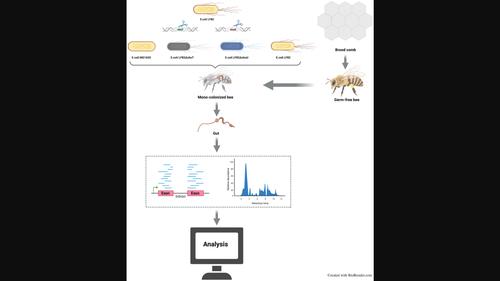当前位置:
X-MOL 学术
›
FEBS Open Bio
›
论文详情
Our official English website, www.x-mol.net, welcomes your feedback! (Note: you will need to create a separate account there.)
Categorization of the effects of E. coliLF82 and mutants lacking the chuT and shuU genes on survival, the transcriptome, and metabolome in germ‐free honeybee
FEBS Open Bio ( IF 2.6 ) Pub Date : 2024-02-26 , DOI: 10.1002/2211-5463.13776 Dongping Feng 1, 2 , Hujun Zhang 3 , Zhengpeng Li 1 , Yiyuan Li 1, 2 , Jingshuang Yan 1 , Yan Zhang 1 , Yunsheng Yang 1, 2
FEBS Open Bio ( IF 2.6 ) Pub Date : 2024-02-26 , DOI: 10.1002/2211-5463.13776 Dongping Feng 1, 2 , Hujun Zhang 3 , Zhengpeng Li 1 , Yiyuan Li 1, 2 , Jingshuang Yan 1 , Yan Zhang 1 , Yunsheng Yang 1, 2
Affiliation

|
The precise etiology of inflammatory bowel diseases (IBDs) remains elusive. The Escherichia coli strain LF82 (LF82) is known to be associated with IBD, and we hypothesized that this association may be related to the chuT and shuU genes. Here we constructed a germ‐free (GF) honeybee model to investigate the effects of LF82 chuT and shuU genes on the honeybee intestine and their mechanisms. The chuT and shuU gene deletion strains LF82∆chuT and LF82∆shuU were generated by CRISPR‐Cas9. These strains, together with nonpathogenic E. coli MG1655 (MG1655) and wildtype LF82, were allowed to colonize the guts of GF honeybees to establish single bacterial colonization models. Intestinal permeability was assessed following the administration of a sterile Brilliant Blue (FCF) solution. Comprehensive transcriptomic and metabolomic analyses of intestinal samples indicated that MG1655 had few disadvantageous effects on honeybees. Conversely, colonization with LF82 and its gene‐deletion mutants provoked pronounced activation of genes associated with innate immune pathways, stimulated defensive responses, and induced expression of genes associated with inflammation, oxidative stress, and glycosaminoglycan degradation. Crucially, the LF82∆chuT and LF82∆shuU strains perturbed host heme and iron regulation, as well as tryptophan metabolism. These findings suggest that the deletion of chuT and shuU genes in E. coli LF82 may alleviate intestinal inflammation by partially modulating tryptophan catabolism. Our study proposes that targeting iron uptake mechanisms could be a potential strategy to mitigate the virulence of IBD‐associated bacteria.
中文翻译:

大肠杆菌LF82和缺乏chuT和shuU基因的突变体对无菌蜜蜂生存、转录组和代谢组的影响的分类
炎症性肠病(IBD)的确切病因仍然难以捉摸。这大肠杆菌 已知菌株 LF82 (LF82) 与 IBD 有关,我们假设这种关联可能与楚特 和舒尔 基因。在这里,我们构建了一个无菌(GF)蜜蜂模型来研究 LF82 的影响楚特 和舒尔 蜜蜂肠道基因及其机制。这楚特 和舒尔 基因缺失菌株 LF82ΔchuT 和 LF82ΔshuU 是通过 CRISPR-Cas9 产生的。这些菌株与非致病性菌株一起大肠杆菌 MG1655 (MG1655) 和野生型 LF82 被允许在 GF 蜜蜂的肠道内定植,以建立单细菌定植模型。给予无菌亮蓝(FCF)溶液后评估肠道通透性。对肠道样本的全面转录组学和代谢组学分析表明,MG1655 对蜜蜂几乎没有不利影响。相反,LF82及其基因缺失突变体的定植引起了与先天免疫途径相关的基因的显着激活,刺激了防御反应,并诱导了与炎症、氧化应激和糖胺聚糖降解相关的基因的表达。至关重要的是,LF82ΔchuT 和 LF82ΔshuU 菌株扰乱了宿主血红素和铁的调节以及色氨酸代谢。这些发现表明删除楚特 和舒尔 基因在大肠杆菌 LF82 可以通过部分调节色氨酸分解代谢来减轻肠道炎症。我们的研究提出,针对铁摄取机制可能是减轻 IBD 相关细菌毒力的潜在策略。
更新日期:2024-02-26
中文翻译:

大肠杆菌LF82和缺乏chuT和shuU基因的突变体对无菌蜜蜂生存、转录组和代谢组的影响的分类
炎症性肠病(IBD)的确切病因仍然难以捉摸。这



























 京公网安备 11010802027423号
京公网安备 11010802027423号